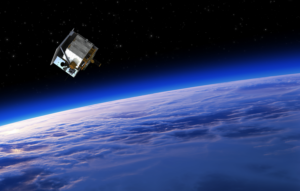Former Capella Space and Planet executive joins Hydrosat
By Debra Werner

WASHINGTON – Scott Soenen, who held key engineering jobs at Capella Space and Planet, is the new chief technology officer of Hydrosat, a data analytics company building a satellite constellation to produce a global thermal infrared map.
“If you are looking for the one person that has engineered successful remote sensing data platforms across three high-growth commercial satellite operators, Scott is that person,” Hydrosat CEO Pieter Fossel said in a statement. “Scott is not only an exceptional engineer, he is also an exceptional company builder.”
Earlier in his career, Soenen served as chief technology for RapidEye, the German company operating a constellation of commercial Earth-observation satellites that was acquired by Blackbridge Ltd. Planet acquired the RapidEye constellation in 2015. After the acquisition, Soenen became Planet’s senior vice president for product engineering. In 2018, Soenen moved to Capella Space to be the vice president for product engineering.
Now, Soenen is joining Hydrosat because he is convinced the firm’s data products can help address challenges related to food security, water scarcity and climate risk.
“We share a vision that with every passing year these issues become more important and commercial Earth observation will play a key role in better understanding and responding to them,” Soenen told SpaceNews by email. “This is one of the few areas in tech where there is truly an opportunity to do good for the planet, while also doing well commercially.”
Soenen sees opportunities, for example, to apply thermal infrared imagery to precision agriculture, commodities forecasting, irrigation optimization and corporate infrastructure risk management. Companies will be able to evaluate the threat to their facilities posed by wildfires, for example.
As Hydrosat chief technology officer, Soenen will be one of the Hydrosat leaders responsible for defining and developing the company’s thermal infrared and multispectral satellite system, data products and distribution platform.
Initially, Soenen will focus Hydrosat’s inaugural multi-spectral infrared mission, called VanZyl-1 and scheduled to launch with Loft Orbital in early 2022. The VanZyl-1 imager is designed to detect water stress, monitor wildfire risk and monitor agriculture.
“No single approach to remote sensing is sufficient to characterize all of the changes that we are seeing on the planet,” Soenen said. “You can’t solve all of the world’s challenges with 3U cubesats and visible/near infrared cameras alone. Thermal infrared remote sensing and land surface temperature are key pieces of the puzzle, but available sources are disparate or lacking in either revisit or resolution.”
The current sources “are sufficient for understanding larger scale trends, but it’s difficult to decide if an individual crop is experiencing water stress” with imagery with a resolution of 1 kilometer per pixel, Soenen said. “Hydrosat’s commercial option for frequent, high-resolution observations of land-surface temperature will be the puzzle piece that enables individuals and companies to see issues more clearly and take timely action at the right scale,” he added.
February 23, 2021 at 06:30PM
via SpaceNews read more...

Post a Comment